Longing For Redemption
I hate the reminders that we live in a cursed world and its devastating to know that mankind can not only be less than good but evil.
The reality is that the world I live in is not okay. Its fallen and broken and whether I want to or not the signs are everywhere. I ignore them a lot because its more comfortable to do so. I don't like to think about it because it reminds me of how evil I can be.
This is a world that longs for redemption. The writer says as much in Psalm 42.
Psa. 42:4 My heart is breaking as I remember how it used to be: I walked among the crowds of worshipers, leading a great procession to the house of God, singing for joy and giving thanks amid the sound of a great celebration!
I can get so caught up in myself and my little world that I've created that I forget I'm not supposed to be here like this. This cursed world is not my home. I want to remember how it is supposed to be. In the middle of the chaos and anguish brought into our lives by evil men I need to meditate on the fact that this is why Jesus was born. His birth, death, and resurrection serve to bring ultimate hope.
While I can't put into words the emotions I have at this moment being that I'm a daddy to three precious kids, I want the cry of my heart even in its anger and questioning to rest on the hope that my Savior brings.
Titus 2:12-13 ...We should live in this evil world with wisdom, righteousness, and devotion to God, while we look forward with hope to that wonderful day when the glory of our great God and Savior, Jesus Christ, will be revealed.
Lord Jesus come quickly.
A Shot of Faith to the Head
About a 18 months ago I read Tim Keller's book The Reason for God and it ignited in me a renewed passion for apologetics and philosophy, specifically Christian philosophy.
There has been a renaissance of sorts in the past 40 years after many thought that Christian philosophy was dead. The charge has been led in large part by Alvin Plantinga a professor of philosophy at Notre Dame.
 One of Plantinga's students Mitch Stokes, is the author of A Shot of Faith to the Head. In his book he has done an incredible job of consolidating Plantinga's philosophies and through succinct clear writing and dry wit has made some rather heady philosophy accessible, readable and understandable.
One of Plantinga's students Mitch Stokes, is the author of A Shot of Faith to the Head. In his book he has done an incredible job of consolidating Plantinga's philosophies and through succinct clear writing and dry wit has made some rather heady philosophy accessible, readable and understandable.
In this book Stokes takes aim at the militant sect of New Atheism. His stated goal is give believers in Christianity confidence in what they believe through rational thinking. Its a good challenge because a good number people in the West who were brought up in the church never really questioned nor thought critically about what they were being taught.
True faith is not believing in something because your parents or friends do but because you've thought it through and have made it personal to you.
In the first section of the book Stokes takes on the question that belief in a God is irrational. This is a great foundation because if belief in a God is irrational to begin with there is no use philosophizing about his existence. This section gets a bit deep and for me required several read throughs but his arguments are convincing.
I'll note that one of the best parts of the book are the "for your arsenal" sections at the end of each chapter. These give a "Cliff Notes" style recap of what the chapter contained. This makes it convenient to read back and pick up on the major highlights.
Evidentialism is main focus of Stokes first attack. Most atheists (and too many believers for that matter) are evidentialists, which means in order for beliefs to be rational they require sufficient evidence.
Stokes claims that evidentialism is false in that if all beliefs require evidence then the evidentialists belief that evidentialism is true is ultimately irrational. At some point we need beliefs that haven't been reasoned to. We need beliefs that are not supported by other beliefs as way of arguments.
Stokes continues to argue that all reasoning needs a place to stand, a foundation. These foundational beliefs (like believing that our senses are working correctly) can be believed without any inference whatsoever and are perfectly rational.
The second half of the book deals with two of the most difficult objections to the existence of God for the believer - mainly that "Science has shown there's no God" and the problem of evil.
Stokes starts this second half by arguing that there is no conflict between science and religion and that the whole mess began with some revisionist history concerning Galileo. He argues that the conflict was not because of Galileo's views on science but between Christians on how to best interpret Scripture. Since this time atheists have pointed back to this incident as an indictment against religion.
For the problem of evil Stokes argues that there are two versions: The logical problem and probabilistic problem. First there is a need to show that there is not a logical inconsistency between the existence of God and the existence of evil. Is there a way that God and evil can co-exist? Stokes says that it would not be possible for God to create creatures with free will without allowing for the possibility of evil.
Second the probabilistic view says that it is highly unlikely (but not impossible) that God exists because evil exists. The issue here is our finite minds. Just because we can't think of a good reason to allow evil doesn't mean there isn't one.
As stated by the subtitle (Be a Confident Believer in the Age of Cranky Atheists) Stokes wants the believer to know that they can stand strong intellectually under the mockery and derision that has caused many believers to doubt and many doubters to suspend belief completely.
Much like Keller's work The Reason For God, Stokes' A Shot of Faith to the Head provides a wonderful rational defense to belief in God and succeeds in allowing reason to be on the believer's side.
Though I had to read sections over and over because my lazy mind tends to wander under the weight of philosophy I emerged more confident in my beliefs would highly recommend this book.
Acting the Miracle and Waging War On My Sin
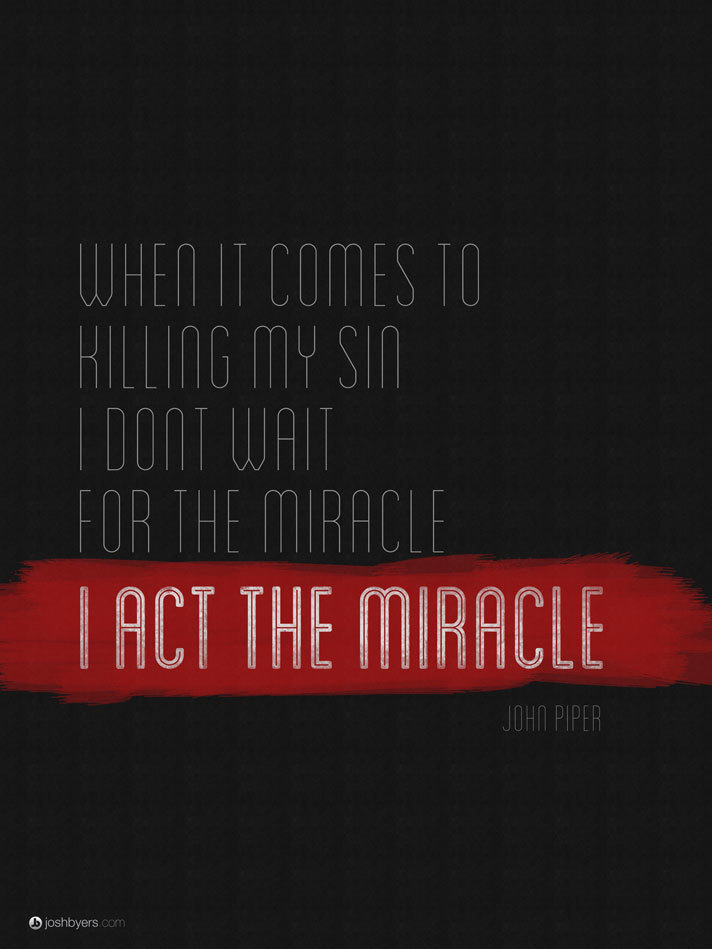
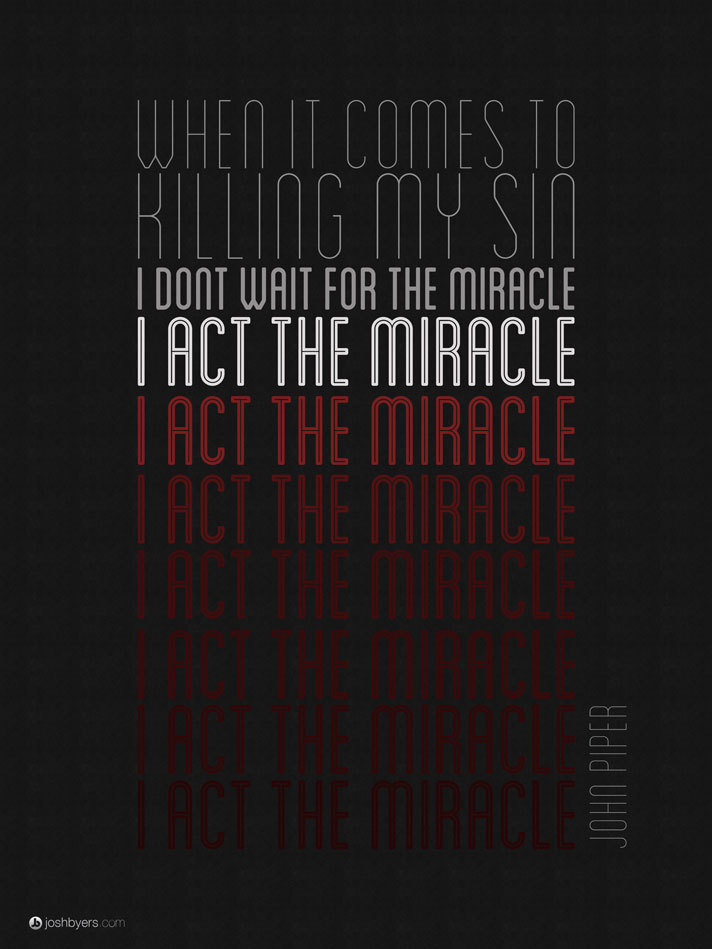
This past weekend I ran across a blog post on desiringgod.org announcing a design contest to design a poster that featured one of John Piper's quotes. It obviously caught my attention as I've been producing visual theology pieces for Tim Challies and few to highlight on this site. But unlike the other pieces I've done the subject matter of this poster really grabbed my attention. Act the Miracle.
At first I wasn't quite sure what it meant but as I dug deeper and found the original post and sermon where John Piper explains what it meant to act the miracle, it really began to hit home for me.
Piper said this in his sermon:
Acting a miracle is different from working a miracle. If Jesus tells a paralyzed man to get up, and he gets up, Jesus works a miracle. But if I am the paralyzed man and Jesus tells me to get up, and I obey and get up, I act the miracle. If I am dead like Lazarus and Jesus commands me to get up, and I obey, Jesus works the miracle, I act the miracle.
There are all sorts of scriptures that teach this but I had never put it into this context before.
In Romans 8:13 Paul says, “If by the Spirit you put to death the deeds of the body, you will live."
In 1 Corinthians 15:10 again Paul says, “I worked harder than any of them, though it was not I, but the grace of God that is with me”
And in Philippians 2:12-13 it says “Work out your own salvation with fear and trembling, for it is God who works in you, both to will and to work for his good pleasure.”
So practically what does this look like?
One of the things I'm most on guard about is lust and pornography. Working on the internet, reading feeds and tweets, clicking on links involves a daily battle and one that I am prepared to fight. I run away from this stuff, I meditate on what is pure and holy, I think about what Jesus did for me on the cross and like the verses above I'm able to put to death the sin of lust.
But what if I applied this strategy to other areas of my life? What if when I get angry with my kids I would go into full on battle mode? What if when I get selfish with my wife I would wage war? What if I would act the miracle in more areas of my life?
Its my prayer that I will.
The art I created is below. Feel free to download and distribute but please don't sell. If you feel so inclined you can also visit the Facebook pages where the contest is being held and like my art.
Link to Facebook poster number oneLink to Facebook poster number two
Where Was God in Aurora?
 As a Colorado native the shooting in Aurora much like the Columbine shootings in 1999 have had a profound impact on me. Like most people I'm saddened, outraged and have many questions. In fact every time a horrible tragedy occurs whether its a mass shooting or natural disaster questions from believers and skeptics alike abound. One question I do not have however is the question of where God was when this tragedy unfolded.
As a Colorado native the shooting in Aurora much like the Columbine shootings in 1999 have had a profound impact on me. Like most people I'm saddened, outraged and have many questions. In fact every time a horrible tragedy occurs whether its a mass shooting or natural disaster questions from believers and skeptics alike abound. One question I do not have however is the question of where God was when this tragedy unfolded.
The question of "where was God when..." is asked probably most frequently because our concept of God is of a being who dislikes tragedy and suffering and it doesn't seem to jive when tragic events occur.
I am writing from the perspective of a believer and Christian so my view is obviously different from that of a skeptic. I do think there are good answers and want to try and explain as simply as possible to bolster the faith of the believer and to try and answer the questions of the skeptic.
The Problem of Free Will
When someone asks the question "where was God when...?" typically behind the question is a frustration that God did not step in and prevent the tragedy from occurring. The source of the frustration is that God is supposed to be all-powerful and could prevent anything that he desired. So why didn't he?
First ask yourself this question. How much would you want God to intervene? Would you wish him to prevent all natural disasters? Would you want all murders stopped? Would you want all child-abuse to be eliminated? I think all of us would desire those things. But take it a step further. Would you want all lying to be stopped or to get fairly trivial would you want God to intervene so you never stubbed your toe?
The point is, where you draw the line for God's intervention in human affairs? At what point does God's intervention prevent us from having free will?
And that really is the point. Because God has chosen to give us free will he cannot by definition "make" us only choose to do good all the time. And because all humans have free will they have a choice to help their fellow man or harm their brother.
It all Seems So Pointless
The problem of suffering and evil in the world is undoubtably one of the hardest questions for the believer to answer but I do think there are some good answers.
Many skeptics have said that a good, all-knowing, all-powerful God would not allow pointless suffering in the world. Because there appears to be much pointless suffering they say God cannot exist.
Tim Keller in his book The Reason for God makes this point: "Tucked away within the assertion that the world is filled with pointless evil is a hidden premise, namely, that if evil appears pointless to me, then it must be pointless."
Of course what this assumes is that our minds should be able to plumb the depths of God's mind and understand every reason he has for what he does. Many people assume that if there are good reasons to allow suffering then they should be accessible to our minds but why should this be? Logically this doesn't hold up.
Also consider how hard times and suffering actually help people to get through life. Many people would admit that most of what they really needed for success in life came out of their experiences with pain and struggle. A lot of times in hindsight people will look back and see that suffering is exactly what they needed to help them in the future.
Keller says later: "...with time and perspective most of us can see good reasons for at least some of the tragedy and pain that occurs in life. Why couldn't it be possible from God's vantage point, there are good reasons for all of them?"
If you are mad because you believe God is all-knowing and powerful enough to stop suffering and hasn't, you have to realize that the same God is all-knowing and powerful enough to have reasons to allow it.
God Really Does Care
One of the reasons I am a Christian is because the Christian faith has answers and hope for suffering. Some people don't care about logic and philosophy and whether or not it all proves or disproves God exists. They are hurting. What I would say to that person is to understand that Jesus put himself on the hook for all of human suffering.
Before God created mankind and gave him free will he knew man would reject him and so Jesus volunteered to come to earth to suffer on our behalf. Not only did Jesus suffer the torture and execution of the cross but he suffered the breaking of the infinite relationship with his father which in my opinion is the greatest suffering anyone has or will go through.
Think of when you have lost a relationship. It hurts to be left by a friend or co-worker. The pain only intensifies if you suffer the loss of relationship with a family member. Now think of the infinite loving relationship Jesus had with his father. To lose that relationship, to have his father turn his back on him as the Bible says would have been more terrible than anyone could imagine. But he did it because he loved us.
So Where Was God in Aurora?
He was where he has always been. Colossians 1:17 says: And he is before all things, and in him all things hold together. God was actively watching and holding this world together. Watching and working with pain as his creation hurts itself and others. Watching and working with love as he desires for his creation to love him back.
God was sovereignly allowing this event to happen not so that we might have the most happiness in life but so that people would ultimately be drawn to him. And when that happens the Bible gives us a promise in Revelation 21:4 that one day suffering will be no more and that every tear will be wiped away.
That is my hope.
Five Ways The Dark Knight Rises Stumbled

While movie trilogies are fairly common its rare that all three movies are epic hits. In fact some might argue that there have only been 2 epic trilogies - the original Star Wars and The Lord of the Rings. More common is when either the first or the first two movies are epic and the third falls flat. In my life there have been three movie trilogies that I was really excited to see the end to. And when I say "excited" I mean stand in line for hours, pre-buy tickets excited.
- The Matrix Revolutions (2003)
- The Lord of the Rings Return of the King (2003)
- The Dark Knight Rises (2012)
I absolutely hated the Matrix Revolutions and was severely disappointed - mainly because I wasn't smart enough to get the trilogy while Return of the King exceeded my expectations and is the gold standard when it comes to ending out a trilogy in my opinon.
As of now I feel like The Dark Knight Rises falls somewhere in the middle. All said I did really like the movie and it was very entertaining but it doesn't come close to being better than its predecessor The Dark Knight.
This could change as I've only seen it once and these are only my initial thoughts but here are five things that I think The Dark Knight Rises swung and missed on.
1. The pacing in the first act was glacial.
We're treated to a Bond like sequence out of the gate that blows away any action sequence in the previous two Batman movies but are left after that to suffer through was seemed like five or six Michael Caine monologues (and I really like Michael Caine monologues - it was one of the best moments in The Dark Knight).
2. I never connected emotionally with the city under siege.
We weren't really invested in the plight of the cops and we're never really shown how terrible the conditions must have been for ordinary folks. The resistance can for the most part walk around the street and observe the bomb truck unmolested. Really the only horror of the siege that was show was when the rich dude (who probably deserved to die anyway) was exiled onto the ice. And even that wasn't built up very much. And come on did nobody tell these guys how you walk on thin ice? You crawl and spread out your weight...
I guess if you really think about how much of a effect it would have on the world in general to have a city the size of New York under a nuclear siege - to try and convey exactly what that would mean is almost too big an undertaking. I thought this area of the plot fell flat.
3. I didn't understand why the regular people of the city were so fed up with the elite.
This is never explained and we were never able to emotionally invest in the plight (if there was one) of the common person being held under the boot of the elite. Selina Kyle has this great line that says "you're all gonna wonder how you ever thought you could live so large and leave so little for the rest of us." When did this happen?
4. The death of Bane was cliched and really weak.
What do you do when your hero is about to die, you've already had an epic fight scene and you need a reason to get Catwomen back into the city? You have her come bursting in at the last movement guns a blazing and save the day by killing Bane just as he's about to kill our hero.
I really liked Bane as a bad guy. Tom Hardy brought so much presence even without seeing his mouth that he was believable as a terrorist. I even came around on his voice by the end of the movie. But a great villain deserves a great death and being shot by a gun by Selina Kyle just doesn't cut it.
5. The fake death of Batman.
If Batman dies my opinion of this movie skyrockets and moves this trilogy very close to the Lord of Rings. If Batman dies I don't write a mostly negative review. If Batman dies I don't care about nitpicks one through four. But he doesn't.
For all of Christopher Nolans talk about doing things different, and making this a darker grittier version of the Batman genre, and closing out the trilogy I really expected Batman to die.
One of the greatest lines in the movie is when Batman exclaims in his funny gruff voice that he hasn't given Gotham everything yet... implying his life. At the very least I wish Nolan would have let the movie goer decide and debate about whether or not he was dead.
You could have left in the part about the auto-pilot being fixed and you could have even had Alfred lifting up his head after he takes a drink in that little cafe but roll the credits there. Don't show Bruce Wayne's face. Let us debate. Keep it dark.
It also would have seemed to fit better with Christian Bale's portrayal of Bruce Wayne throughout the movie. He was tortured and upset that Batman had to take the fall for Two-Face and he seemed like he had so little to live for anyway. His redemption was the giving of his life - the ultimate sacrifice that would be remembered. It seemed cheap and too easy to give us a "happy" ending.
All that said I still really liked the movie. It was very entertaining, had great action, some really good lines, a good villain and for the most part a good story. Could it have been better? Yes. Will I buy it? No.
I give it four out of five stars.
InfoGraphic: The Humility of Christ To the Glory of the Fathe
The apostle Paul wrote one of the most incredible passages of Scripture in his letter to the Philippian church. In this letter we get a small but absolutely magnificent glimpse of what Jesus Christ did when he left heaven to come to earth. This infographic produced originally for Tim Challies is a visual picture of Philippians 2:5-11. The original format is a tall poster size but I have also converted it for wallpaper for your desktop, tablet, or phone.
This is the fourth infographic in my theology and bible series.
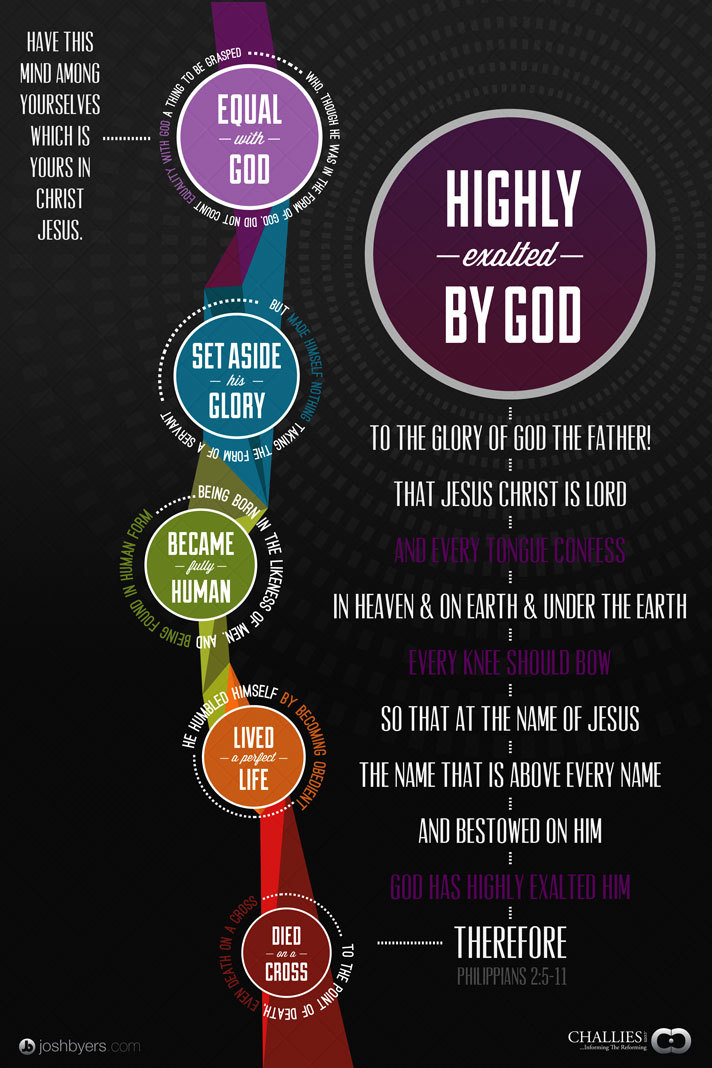
Original Format - High Resolution JPG
The original poster sized graphic is 24"x36" at 150ppi. - Download Original Poster High Resolution
Purchase Poster
Printed posters, canvases, and prints with frames are available at ImageKind.
Desktop and Android Wallpapers
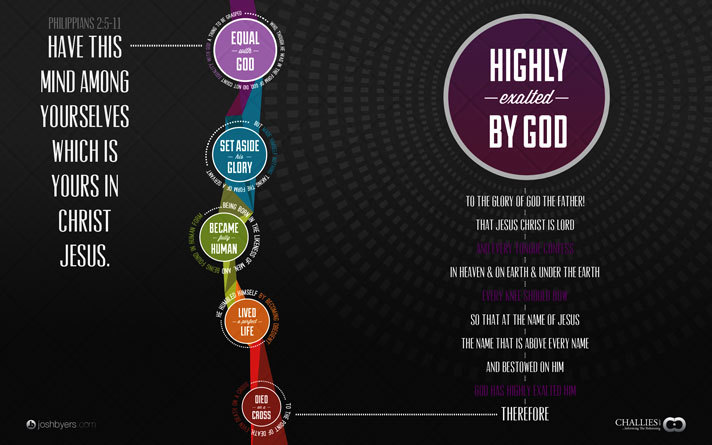
Small - Medium - Large - Extra Large - XXL
iPhone Wallpaper
iPad Wallpaper
Idolatry and Anger Management
Its really not a big surprise this realization that I'm an idolator but rather what I've come to idolize. I'm a father of two awesome kids. They are an incredible gift and I'm reminded every day to cherish life through their wonder, innocence, questions and love.
I love them to death and can't imagine life without them and yet that I fear is the problem. Because even in my desperate love for them I find myself angry at them more often than I want to admit.
I'm a fairly laid back person and as I've examined my life the only times I get worked up to a vocal level is when I'm playing and watching sports or when my kids do something I don't approve of. I've noticed recently that it doesn't take much for me to get angry with them. One minute we'll be playing and having fun and the next second I'll be yelling because one of them didn't obey what I said right away. It frightens me sometimes to hear myself and I'm frightened by the image that I know I'm implanting within them.
Most people would say that I need to "manage my anger." I need to count to ten, walk away, take an anger management class or do something to change my behavior. But I believe it goes much deeper than that.
I want more than anything for my kids to love me. I want them to look back on their childhood and believe they had the best dad in the world. I want them to run to me. I want them to always look to me, to need me, to respect me. This is the desire of my heart.
And while all of these are good things, I've turned them into idols.
Abraham saved from his Idolatry
This all became crystal clear to me as I read through Tim Keller's book Counterfeit Gods. In the first chapter he recounts the story of Abraham and how God gave him the ultimate desire of his heart - a son. Most people are familiar with the story and know that when Abraham's son Isaac reached a certain age God asked Abraham to sacrifice his son, to give him up and back to God.
As a father the idea of this makes me sick and I could never imagine being asked to do this let alone going through with it. The moral ideas presented actually are a big stumbling block to a lot of people and is one of the reasons skeptics say they could never believe in or follow the God of Christianity.
But as Keller points out it was not unloving for God to ask Abraham to do this. I know, it sounds absolutely crazy but when you read and think all the way through it makes perfect sense.
One of the reasons it was not irrational for Abraham to participate was because in that culture the life of firstborn son belonged to God. The firstborn represented the family and because of the sinfulness of mankind and specifically the family, the life of the firstborn son was considered forfeit. God had a right to the life of every family because of their sinfulness. Because God is holy sin cannot be tolerated in his presence and if He is to have a relationship with human beings there has to be some form of atonement for the sin. This was be realized in the sacrifice of Abraham's firstborn son. Because he represented the family his death would cover their sins.
So how could Abraham do this? As Abraham walked his son up that mountain he believed that God was holy and that he owed Him a sacrifice but he also believed in God's grace and believed that God would provide a way for his son to live. This is why in Genesis 22:5 he told his servants that "we will come back to you." And in this Keller says:
Abraham was not just exercising blind faith. He was not saying, "This is crazy, this is murder, but I'm going to do it anyway." Instead he was saying, "I know God is both holy and gracious. I don't know how He is going to be both but I know He will."
If he had not believed he was in debt to a holy God, he would have been too angry to go. But if he had also not believed that God was a God of grace, he would have been too crushed and hopeless to go.
The story continues with God stopping Abraham from sacrificing his son and God providing a ram in his place.
As Abraham walked back down that mountain with his son he understood that God had been testing his love and Abraham was able to see that he treasured God more than his firstborn son.
If God had not stepped into Abraham’s life and had him go through this very difficult time Abraham would have most likely ended up idolizing his son and would have ultimately ended up destroying his life because of his idolatry.
Many years later God had his own Son walk up these same mountains and sacrifice his own life as a substitute for the sins of every family in the world.
When God saw Abraham’s sacrifice He said “...you love me because you been willing to give me the most precious thing in your life.” But how much more was God’s love to us when He gave us his Son Jesus?
When I look at the cross and see what God did for me and all that He gave me I am in need of nothing else. I need Jesus. I need the cross. I need nothing else.
my Anger is Because of my Idolatry
So what does this have to do with idolizing my kids and managing my anger?
I’m realizing that I treasure their response to me more than anything. If they do not respect me and talk to me in a honoring way I feel that I am not getting what I deserve.
This is pride taking over my heart. I feel I’m entitled to this and if I don’t get it my life is not complete.
When I get angry, I’m not really angry with my kids, I’m angry at the love I have not received. Its my selfishness that is driving my response.
I need to realize all the love I need has been provided by Jesus at the cross. When I understand this I don’t need the love of my kids and I can respond to them with love and correction rather than selfishness and anger.
Be Anxious For Nothing

I came across the "Keep Calm and Carry On" meme this morning and was immediately inspired. Several things struck a chord: I love learning about WW2, I'm a big fan of all things British and I love the idea to use beautiful art to convey a much needed message in a time of great turmoil. After listening to the backstory of the piece, Paul's letter to the Philippian church came to mind - specifically chapter four verse six where he instructs them to not worry or be anxious about anything but to pray about everything. As the poster was intended to only be used if the nation was under great duress I can't think of a better message of comfort then to Keep Calm (do not be anxious) and Carry On (carry your burdens to One who cares for you.)
Periodic Table of the Bible
I am excited to be able to launch this graphic! Prominent blogger Tim Challies gave me the idea and asked me to create it for his Visual Theology series. I much prefer these kind of weekend projects instead of snow shoveling or home repair! Just a bit of background on the graphic. The point was to get as much general information about the books as possible while keeping the format simple. Obviously there are a lot directions that the graphic could take but we choose to keep it limited to a few bits of information. A couple ideas that didn't make it in were to list the books by relative size as well as chronological order. It's quite possible those will make it into a future graphic.
My theology is conservative so the authorship and dating of the books will reflect that.
Enjoy!
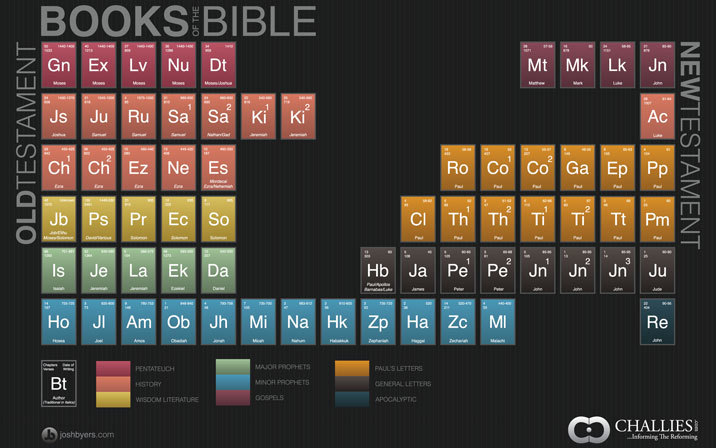
High Resolution PDF
The pdf is all vector so it should be suitable for scaling up to any size you wish. There are two flavors - one is the standard graphic that would be good to send to a print shop and the other has a white background in case you want to print it yourself.
Purchase Poster
Printed posters, canvases, and prints with frames are available
Desktop and Android Wallpapers
Small - Medium - Large - Extra Large - XXL
iPhone Wallpaper
iPad Wallpaper
Jesus is Greater
The video Why I Hate Religion, But Love Jesus has received over 15 million views in the last few days and has generated a lot of conversation and controversy. The main message of the video is that religion causes me to look at my own pedigree or performance to be accepted spiritually and that religion says my motivation to obey God is based on fear and insecurity. On the flip side Jesus came to completely remove all religion. He died so I wouldn't have to. I look to His performance and not my own. My motivation to obey God is out of love and grateful joy.
That conversation has inspired the graphic below. Jesus is greater.
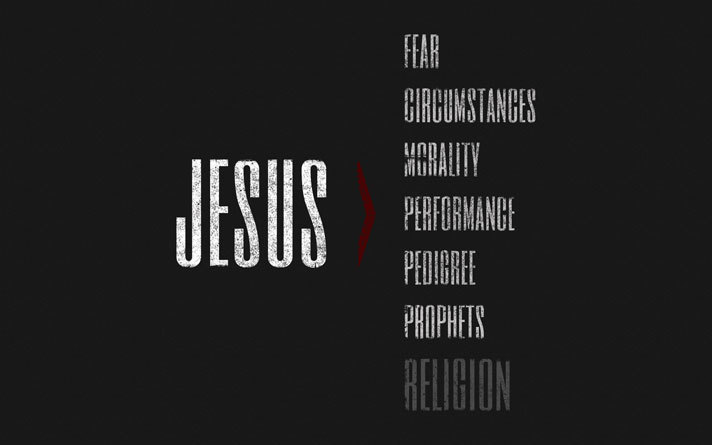
Purchase Poster
Posters, canvases and framed prints are available at ImageKind.
Desktop and Android Wallpapers
Small - Medium - Large - Extra Large - XXL

